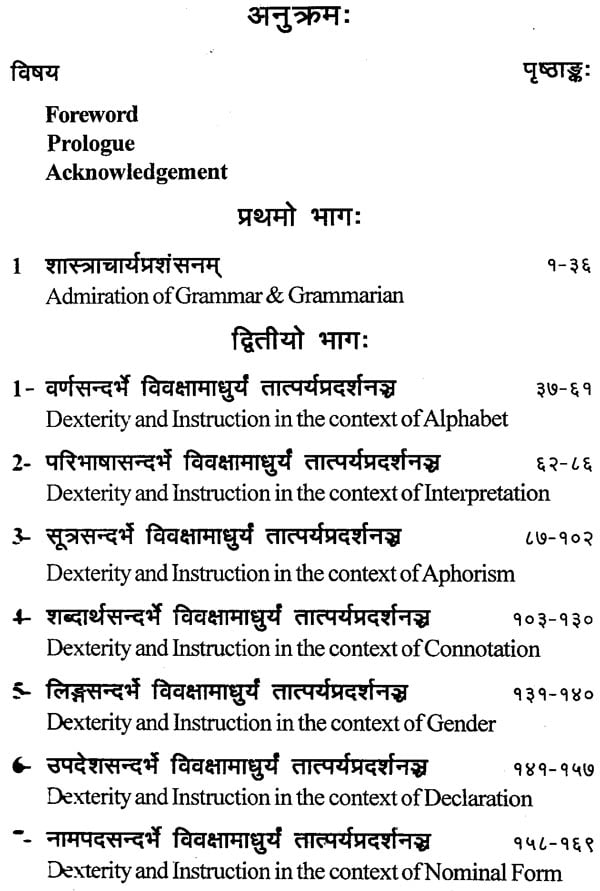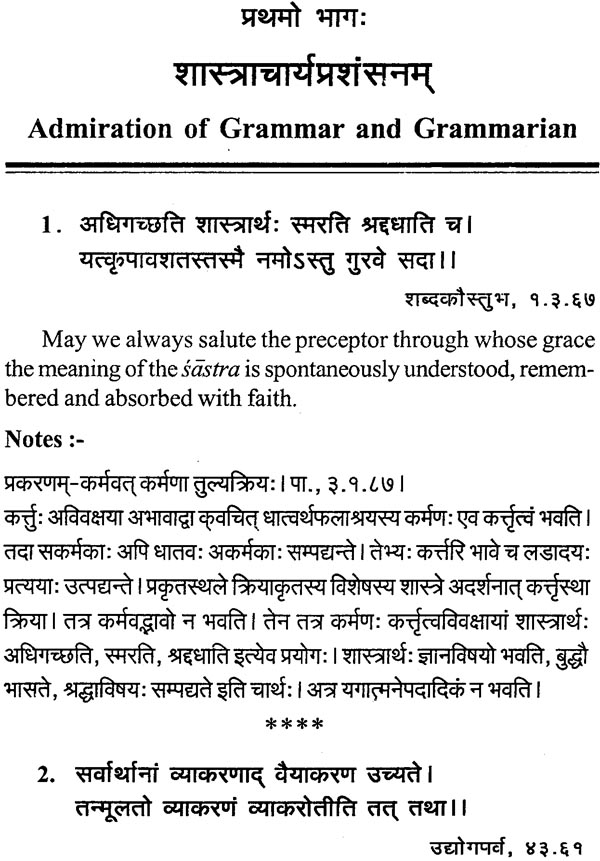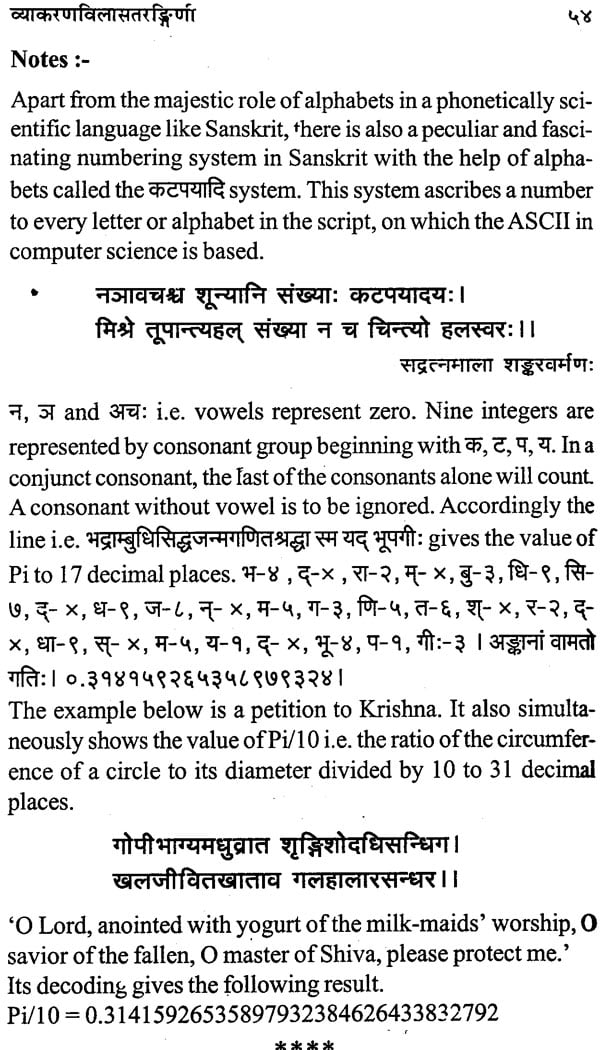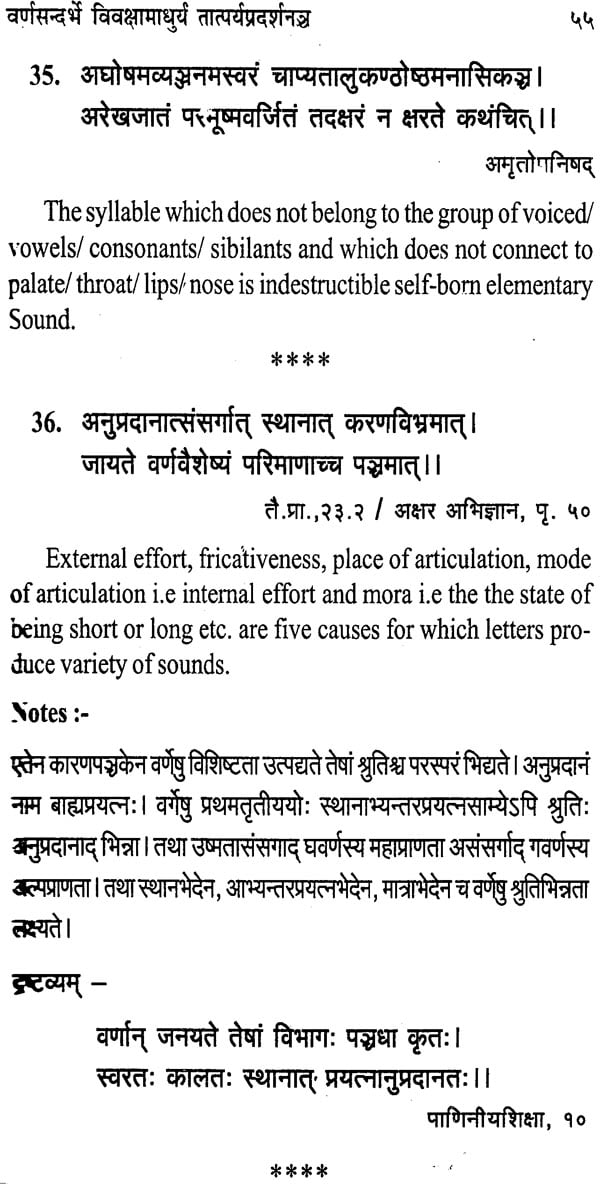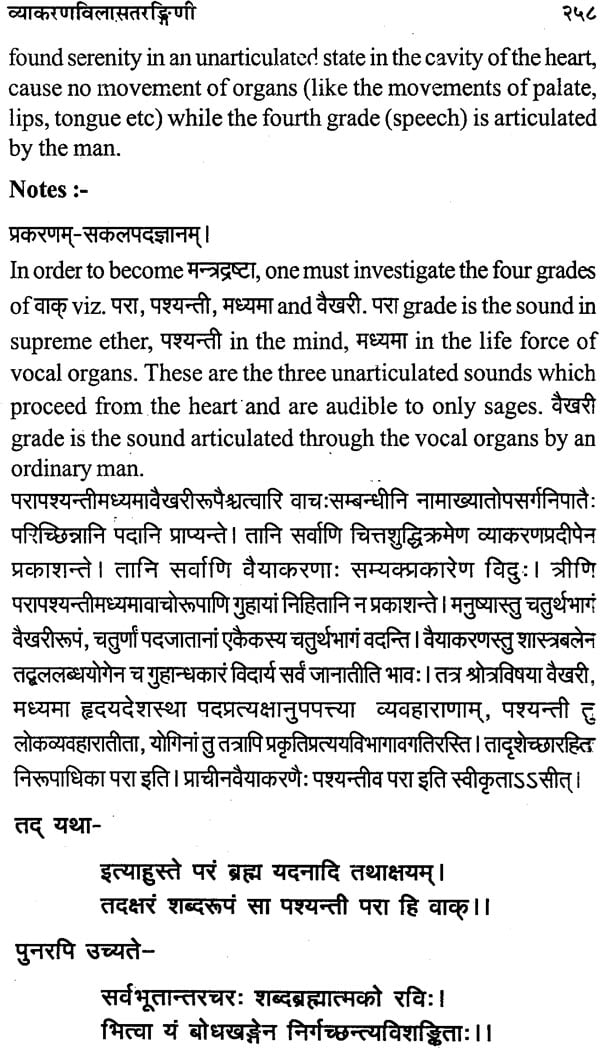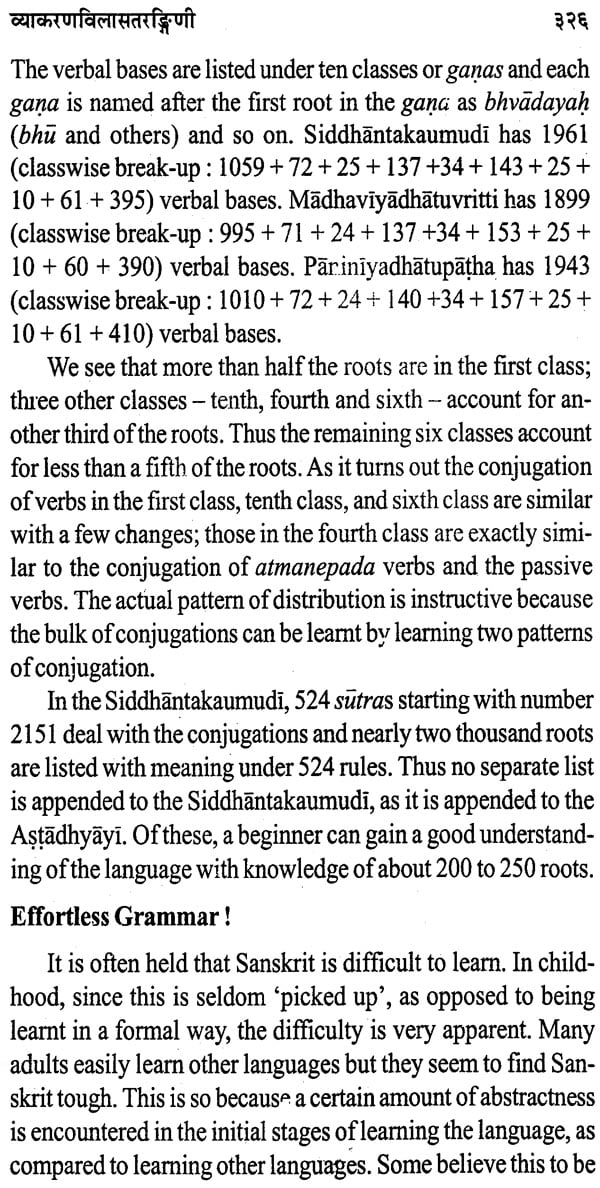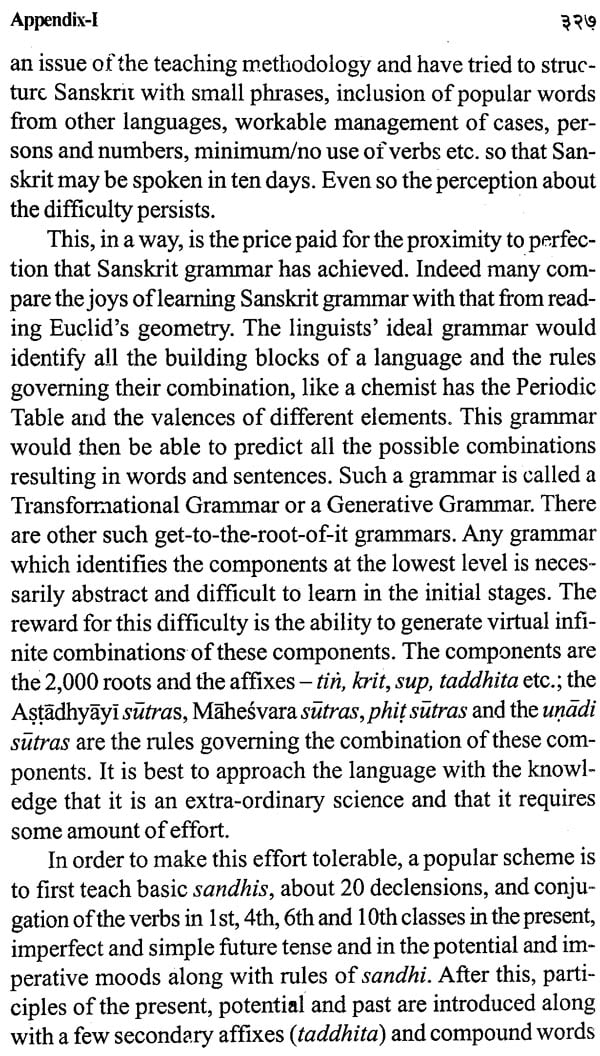
व्याकरणविलासतरङ्गिणी (Vyakaranavilasatarngini): An Anthology of Grammatically Fascinating Sanskrit Verses Advantageous to Academic Communications)
Book Specification
| Item Code: | NAQ438 |
| Author: | Narayan Prasad Dash |
| Publisher: | New Bharatiya Book Corporation |
| Language: | Sanskrit Text With English Translation |
| Edition: | 2018 |
| ISBN: | 9788183153294 |
| Pages: | 382 |
| Cover: | HARDCOVER |
| Other Details | 9.00 X 6.00 inch |
| Weight | 500 gm |
Book Description
Quotations stating definitions, examples, praises and dexterities etc found in this anthological work are only representative in nature. They constitute the verses and the sentences frequently searched for. In one word, grammatical flowers of different colors, fragrances, shapes and graces are kept floating in one revolute i.e. Vyakaranavilasatarangini.
The verses glorifying the devices of grammar may not have the poetic delicacy from the view point of a poetician. Gionbhdtavyaizgya kdvya or a citrakdvya has a larger firma-mint where the stars are blooming with their luster. It depends can the interpretative power and dalliance of the connoisseur and creator. Visvanath Kaviraja extended the scope of rasa in the sense of relish which can be perceived by the receiver. A prose, a poetry, an essay and other compositions may not be taken to be devoid of rasa if they are relished without any discrimination or variation of degree of quality and quantity. When rasa becomes the essence of poetic composition the gunibhutavyarigya and avyaligya kavyas are inferior to the kathiyas having the ragas defined and devised by the poeticians. Prabandharasa, gadyarasa and padyarasa are used in wider sense when the composition bereft of technical ragas creates the relish palatable and blissful having the viblith/a etc in dif-ferment sphere. When the scope of rasa is extended to bhciva, rascibluisa, bhdvasccinti and so on, why will they not include gadyarasa, padyarasa etc. under the shelter of bhdvaKintyddi of Kavyaprakasa. Vinoda, Vilas a, L7a, Krada, Calitaka, Gita, Vrtta, Raga and other devices of relish and embellishment may be covered by rasa in wider sense. The examples of vastudhvani and alathkiiradhvani engulf the sentiment of love and generate aesthetic relish.
The metaphorical compositions comprising paronomasia, subversive speech, poetic trick, comparison, figurative reference, apparent incongruity, hyperboles, interrogation, riddles, chimes and such other compositions do posses the potency of entertainment when the meaning becomes comprehensible by uncovering the hidden beauty with apt use of combining the intense feeling of the poet and identifying spirit of the connoisseur. Kalidasa is a true va-gyogavit as per the analysis of Patanjali. He knows the relation of veda and artha by creating a soothing symmetry between the speaker and the listener. Vaida and artha z.re indistinguishably integrated to mutually beautify one with the other. The sound and meaning have been intrinsically related in all kinds of manifestation of language. It is used not for concealment but for expression of meaning. The sphota theory of grammar has been interpreted for conveying the meaning in word and sentence. The functional value of a word is aimed at proper communication. The human erudition may go deeper in structure but the diction may find the way for creating a friendly atmosphere for conveying proper sense.
Dr. Narayan Prasad Dash, a scholar, poet and connoisseur has spent his life for receiving and comprehending the nuances of Sanskrit language. The present anthology is an attempt to acquaint the beginners with the delicacy of grammar. Vishnusarma took the challenge to teach wayward sons of a king by adopting the thematic appreciation method and be-came a successful model in the history of Sanskrit language. Dr. Dash has made a humble experiment for creating an interest among readers for grasping the beauty of grammar and its technicalities. The flowers have been plucked and collected from different sources and the fragrance is distributed by pre-scenting them in one beautiful flower-vase. The fire of the third eye of Sankara is soothing and benevolent for the devotees but harmful and malevolent for the demons. Devotion or dedication makes a subject simple. Inattentiveness or carelessness makes the subject difficult. Proper care has been taken in the edition through notes, translations and ancillary references for inter-weaving the delicacy of a kestrel like Vyakarana and creating an interest among the readers. Climbing a mountain or crossing an ocean has been made simple. A wooden vessel becomes an instrument for crossing the wavy sea. It is the repeated attempt that makes the problem solved. The task be-comes easier for one who makes an Endeavour.
The introduction deals with the scope, subject and plan of the present compilation. It covers the four anubandhas of the tradition. The part I contains the appreciation of grammar and grammarians. Brahman manifested himself with name and form (Naamrupe Vyakaranvaani). The Vaiyiikarana is the learned one to understand and analyze the manifestation of thbdabrahma. The laudatory verses have been collected from different sources and presented with lucid translation. The first word in the form of pranava was manifested on the basis of a, u and mother beauty of the letters has been uncovered with the adornment of the places of pronunciation. Chapter II contains different views on the source of the letters. The vowels and consonants with their sacred characters have been brought to light. The germination of the letters from the six circuits has been well designed in the tantric literature. The literary compositions with the riddles of the letters do add to the dexterity of the creativity. The game of placing the letters through augmentation, metathesis, elision and other devices creates pleasure in the minds of the readers. The interpretation of the technical terms in different sense exhibits the expertise in handling with a sense of humor. The words like guna, niptita, upasarga, it, virdma, adesa and host of other technical terms bear testimony of match-less scholarship. Different forms of aphorisms like utsarga, apavdda, ahiya, para, vipratisedha and such other words have been used with poetic diction for the playful mood of the connoisseurs. Different maxims used in the grammar have been incorporated with appropriate contexts. The communicative power of the word and the denotative function for conveying the sense has been cited with propriety. The dexterities with reference to the gender and pronunciation of nominal forms have been shown as fine specimens of intellectual artistic forms. The primary sense of a word is that which is understood easily and naturally.
The world of meaning is like intellectual expression which creates delight. The technical devices are employed for merging into the vast ocean of word and meaning. The verbal forms, the euphony, case, compound and miscellaneous samples, the dialogue in the form of inquisition and reply and lampoons adorn the contents of the present compilation. The book has a different kind of flavor with translation and bilingual notes. Scholars, students and general readers have a wider passage to go through the book and enjoy the dexterity of different aspects of grammar with profundity of poetic compositions. The skill, Endeavour and scholarship of Dr. Narayan Prasad Dash have produced an innovative form for intensifying the taste and test for the readers of all sections. I have immense pleasure to go through this book and express my earnest desire that it has the quality to be appreciated by the students of Sanskrit in particular and lovers of Sanskrit in general.
Book's Contents and Sample Pages
